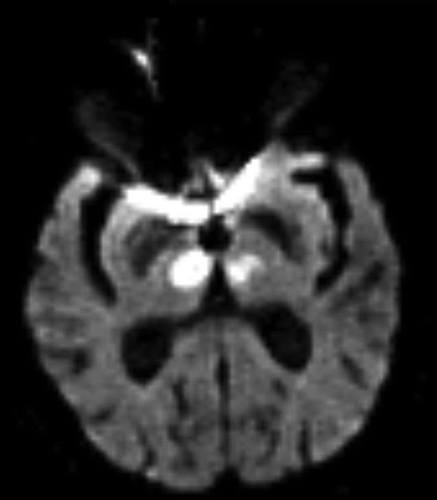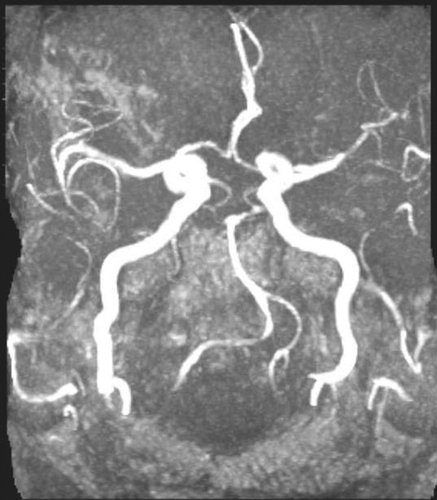Rapid-Onset Cognitive Impairment Due to Bilateral Medial-Thalamic Infarcts
We present an 86-year-old man with hypertension and chronic kidney disease, presenting with 2 days of sudden-onset, fluctuating confusion. The patient was otherwise healthy before the event, being able to take care of his or her own activities of the daily living (ADLs). On exam, he was awake, poorly attentive, minimally verbal, following simple commands intermittently, disoriented, and able to write only his name. The cranial nerves and sensory-motor exams were unremarkable.
The results for complete blood count, blood chemistries, urinalysis, and urine toxicology were unremarkable. Computed tomogram of the head without contrast showed well-demarcated hypodense areas in the medial aspects of both thalamic (not shown). Magnetic resonance image (MRI) confirmed the presence of acute infarcts in the medial aspects of both thalami (Figure 1). Magnetic resonance angiogram showed diffuse atherosclerosis of the intracranial vessels (Figure 2). These infarcts are presumed to be caused by the occlusion of the artery of Percheron, originating at the top of the basilar artery.1

FIGURE 1. Magnetic resonance image (MRI) confirmed the presence of acute infarcts in the medial aspects of both thalami

FIGURE 2. Magnetic resonance angiogram showed diffuse atherosclerosis of the intracranial vessels
Infarcts located in some regions of the brain are able to cause significant cognitive impairment acutely, by affecting a relatively small area of the brain.2,3 These strategic-infarct dementias have being described mostly with unilateral or bilateral lesions of the thalamus, hippocampus, mesial aspect of the temporal lobe, and anterior forebrain.
This type of stroke might spare the sensory-motor systems and cause symmetric damage, as in our patient. Clinicians should suspect strategic-infarct dementia in patients with abrupt-onset cognitive impairment, especially in the context of unrevealing blood and urine testing.
1. : Arteries of the human thalamus, II: arteries and paramedian thalamic territory of the communicating basilar artery [in French]. Rev Neurol (Paris) 1976; 132:309–324Medline, Google Scholar
2. : Vascular cognitive impairment. Lancet Neurol 2003; 2:89–98Crossref, Medline, Google Scholar
3. : Vascular cognitive impairment. Am J Geriatr Psychiatry 2006; 14:724–733Crossref, Medline, Google Scholar



